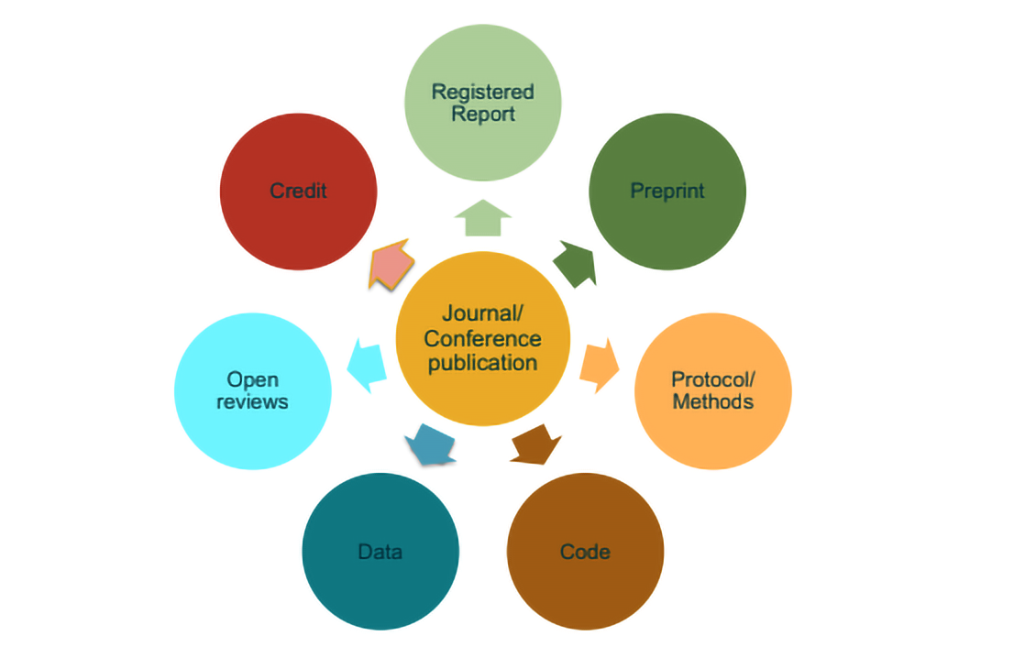At our All-to-All meeting on August 26, 2024, Joerg Heber, who heads the Research Compliance Office at Berkeley Lab, presented an insightful and thought-provoking talk on the importance of ensuring that researchers receive appropriate credit when publishing the results of scientific research and on managing collaborations equitably.
Receiving credit for their achievements “is an integral aspect of any researcher’s work,” said Heber, adding, “Others use these research outcomes to utilize discoveries and enable them to build on the results of this work, while credit is provided through authorship on these contributions.”
While research outputs are disseminated in many ways, with journal publications and conference proceedings remaining key, he said, “Other outputs, such as shared data, software and codes, methods and protocols, and preprints often complement them.”
However, Heber noted that navigating this system of research outputs and authorship contributions can be challenging.
“Who should be credited with authorship, and who shouldn’t? What is the best way to reach such decisions, and how can we avoid conflicts between prospective authors on who should be a named author? How does this influence collaborations?”
“The best advice,” he continued, “is that discussions about authorship and collaboration roles should be held before a research project starts. What are the roles and responsibilities in a collaboration? Who leads what aspect of the work and makes decisions? What are the timelines, and how is authorship assigned?
New projects usually require renewed discussions about authorship and roles, even with established collaborators. For instance, what is the publishing strategy, what are the roles in a project, and what contributions are expected for authorship? What are the expectations for follow-up work beyond the agreed collaboration? Clear expectations, said Heber, need to be established for current publications and future work. “If there are any doubts, discuss them openly with everyone relevant to the research.”
How authorship and other factors, such as authorship order, are decided may vary considerably from research field to research field. Academic journals usually suggest the following contributions to qualify one as an author:
- Substantial contributions to the conception or design of the work or the acquisition, analysis, or interpretation of data for the work and
- Contributions to drafting the work or reviewing it for intellectual content and
- Final approval of the version to be published and
- Agreement to be accountable for their contributions to the work in ensuring that questions related to the accuracy or integrity of any part of the work are appropriately investigated and resolved.
Authors fulfilling the first criterion, said Heber, should be allowed to participate in the review, drafting, and final approval of the manuscript, adding that “reasonable efforts should be made to reach all co-authors during this process.”
Conversely, he adds, not everyone will qualify as an author. For example, an honorary or guest contributor who has not contributed meaningfully to a study “should not be acknowledged.”
Being proactive, starting discussions early, and involving everyone who might feel a linkage to the work, even if they do not become authors, are best practices that can help prevent issues. However, he added that despite the best efforts to reach a consensus on authorships, differences in opinion can arise. This, he noted, is common. “When it happens, it is recommended to bring conflict up to the next level of line management, such as supervisors or division leadership. If necessary, Lawrence Berkeley National Laboratory can issue a decision.”
According to Heber, input from local line management can effectively resolve such conflicts and be very helpful as a neutral point of view toward the dispute.
Aside from authorship matters, the Research Compliance Office offers several other services for the Berkeley Lab. For example, the office provides a service to assist authors in changing their names on already published research outputs. It also manages research integrity, ethics, and security for the Lab, export control, conflict of interest, conflict of commitment programs, and the human and animal regulatory committees.
To learn more …
For more information on ATAP News articles, contact caw@lbl.gov.
